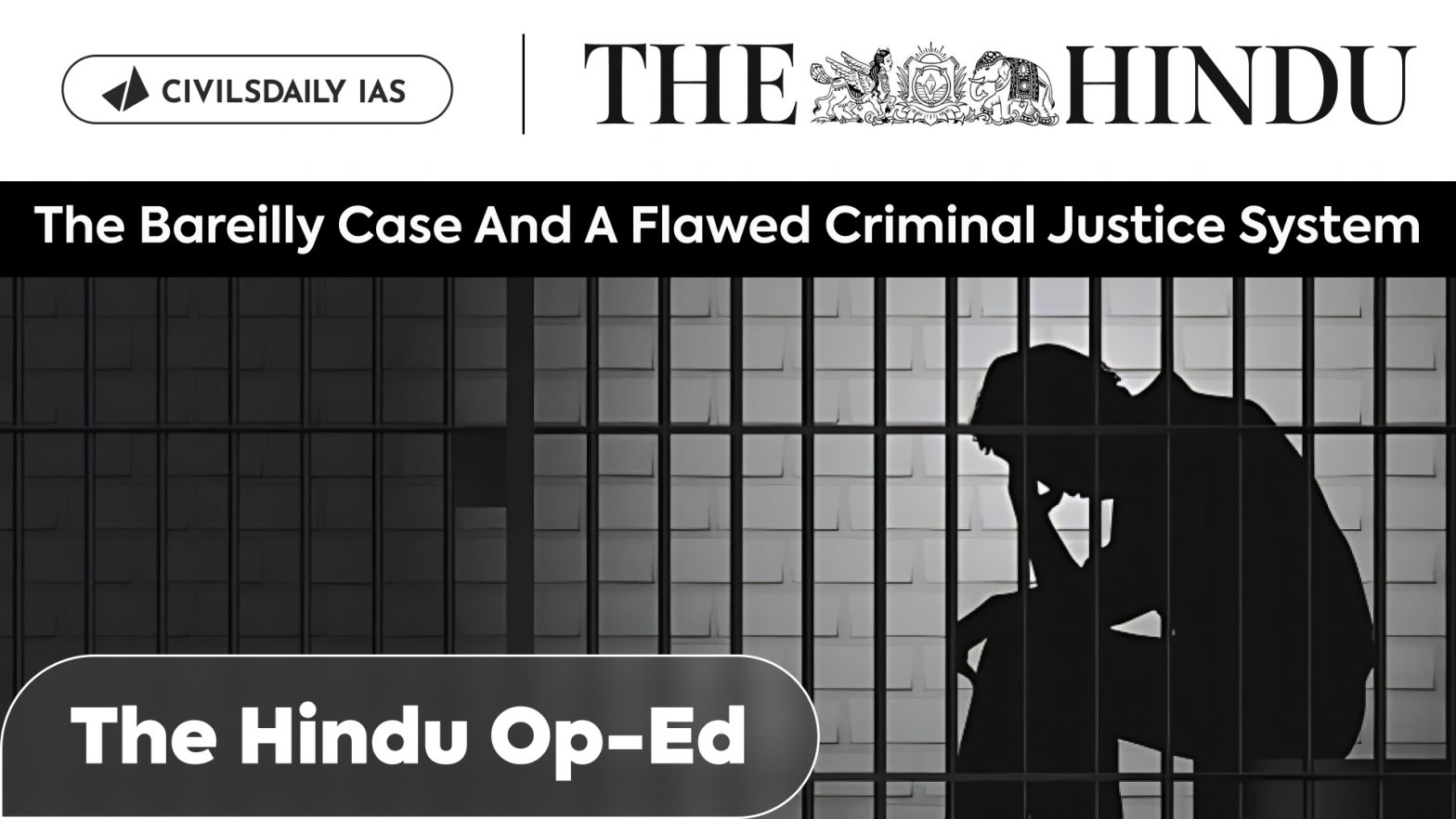PYQ Relevance: Prelims: Q) Consider the following statements: (UPSC CSE 2023) Statement-1: In India, prisons are managed State Governments with their own rules and regulations for the day-to-day administration of prisons. Statement-2: In India, prisons are governed by the Prisons Act, 1894 which expressly kept the subject of prisons in the control of Provincial Governments. Which one of the following is correct in respect of the above statements? (a) Both Statement-I and Statement-2 are correct and Statement-2 is the correct explanation for Statement-1 (b) Both Statement-1 and Statement-2 are correct and Statement-2 is not the correct explanation for Statement-1 (c) Statement-1 1s correct but Statement-2 is incorrect (d) Statement-1 Is incorrect but Statement-2 is correct Q) Consider the following statements: (UPSC CSE 2023) 1. According to the Constitution of India, the Central Government has a duty to protect States from internal disturbances. 2. The Constitution of India exempts the States from providing legal counsel to a person being held for preventive detention. 3. According to the Prevention of Terrorism Act, of 2002, confession of the accused before the police cannot be used as evidence. How many of the above statements are correct? (a) Only one (b) Only two (c) All three (d) None |
Note4Students:
Prelims: Preventive Detention;
Mains: Criminal Justice System in India; Challenges with Fast Track Courts;
Mentor comment: Preventive Detention law was passed in1950 for the first time. The aim of implementing the Preventive detention was not to punish the individual but to prevent that person from doing a wrong and unconstitutional act. According to Finley, “it is not punitive but a precautionary measure”.
The Indian criminal justice system faces several other challenges too. One of the major challenges is a large backlog of pending cases, which can result in long delays and delays in the delivery of justice. The Indian criminal justice system is also criticized for being slow, inefficient and prone to corruption, that is why, we introduced Fast Track Court system. Investigations are often incomplete or either lack thoroughness, leading to weak cases and wrongful detentions in this type of courts too. One of the live example of this is being highlighted in today’s editorial.
Let’s learn.
–
Why in the News?
A woman who had filed a rape case was sentenced to imprisonment and fined by a court in Bareilly, Uttar Pradesh, leading to a narrative that perpetuated the stereotype that false rape claims are common.
- However, a closer examination of the trial proceedings highlights systemic shortcomings in law enforcement and social complexities that require urgent attention.
| BACKGROUND STORY: About Lack of Spirit or Liveliness in the Investigation process: •Initial Complaint: The girl’s mother filed a missing person’s complaint stating that her 15-year-old daughter (medical examination showed her to be 18 years old) was missing and suspected a person kidnapping her. However, the girl appeared a few days later, claiming she was taken to Delhi by the same suspected person and raped by him. •Lack of Medical Evidence: The Girl refused to undergo a thorough medical examination, crucial for the prosecution’s case (in fact clothes were not collected for forensic analysis). Hence, the lack of medical evidence due to the negligence of the investigating officer and Pooja’s refusal to undergo a medical examination weakened the prosecution’s case. •Administrative Failure: The respective magistrate did not direct further investigation despite glaring gaps. Moreover, the public prosecutor endorsed a weak charge sheet, failing to fulfill their duty to the court and the public. ○ Section 173(8) of the CrPC allows a magistrate to direct further investigation in case of a flawed investigation. Further, the magistrate could call for the case diary under Section ○ (172(2) of the CrPC, which may have revealed discrepancies or inadequacies in the investigation. |
The Issue with Undertrial Detention
- Prolonged Incarceration: One of the tragedies of the Indian prison system is the high proportion of undertrial prisoners (around two-thirds). Undertrial prisoners are kept in prison while awaiting trial or during their trial. The accused boy in this case remained in jail for over four years without accountability for the investigating officers or prosecution.
- Lack of Accountability: There were no repercussions for those responsible for wrongful detentions, perpetuating a culture of impunity and undermining public confidence in the integrity of judicial processes.
- His trial dragged on in a fast-track court in Bareilly amidst the disruptive backdrop of the COVID-19 pandemic.
- Violates the Fundamental Right: Prolonged undertrial detention violates their Rights to Liberty and Fair trial, adversely impacting their lives and livelihood.
- The trial in this case spanned 1,559 days, in which there were 109 hearings (data from the e-Courts portal).
- The overuse of undertrial detention effectively ends up punishing people before they are convicted and makes a mockery of their right to be presumed innocent until proven guilty.
The state of Fast-track courts in India
- Budgetary Allocation: The centrally sponsored scheme for Fast Track Special Courts (FTSC) has been extended till 2026 with a budgetary allocation of around ₹2,000 crore, despite systemic challenges.
- Inadequate Infrastructure: Fast-track courts lack dedicated infrastructure and judges, leading to existing courts being designated for these cases, causing judges to manage both regular and expedited cases.
- Bail Issues: In this case, the accused person’s bail application was rejected due to the serious nature of the offense, and he remained in jail until his acquittal. His family lacked the means to file an appeal. Indifference and poverty prolong undertrial detention.
- Reforms Needed: The case highlights the need for enhancements in police investigation protocols, prosecutorial autonomy, and judicial supervision to mitigate the risk of wrongful and protracted imprisonments.
Conclusion: Ultimately, the notoriety surrounding this case is cited to bolster the stereotype of women lodging false accusations against men, which highlights a critical call for reforms within the criminal justice system. This case highlights the necessity for enhancements in police investigation protocols, prosecutorial autonomy, and judicial supervision to mitigate the risk of wrongful and protracted imprisonments.

